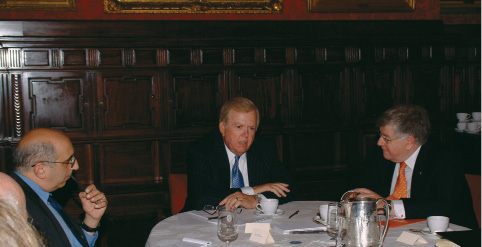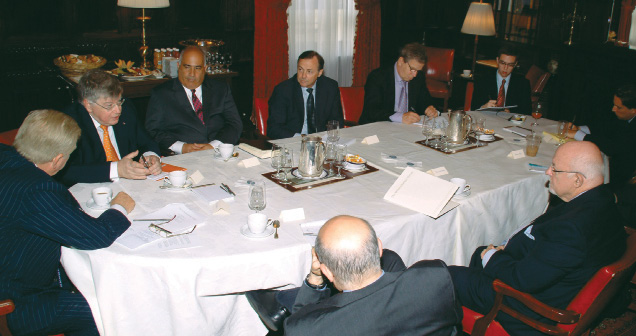


![]()
ONLINE

The Future of Telecommunications

On June 25, 2010, radio talk-show host, Lou Dobbs met with industry experts and political leaders to discuss the future of telecommunications around the world. Pictured (from left to right): Art Kleiner, Lou Dobbs, and Didier Lombard.
Editors’ Note
Didier Lombard is also a director at Thompson and Thales and a member of the supervisory board at Radiall and STMicroelectronics. He joined France Telecom in 2003 as Senior Executive Vice President in charge of technologies, strategic partnerships, and new usages. Between 1988 and 2003, he worked with the French Ministry of Research and Technology and the Ministry for the Economy, Finance and Industry and was then founding Chairman of the French agency for international investment. He began his career in 1967 at France Telecom’s CNET (currently the research and development division) where he worked on developing new products for satellites, electronic components, and wireless systems. He is a graduate of the École Polytechnique and the Télécom Paris.
Company Brief
France Telecom is the main telecommunications company in France, the third largest in Europe, and one of the largest in the world. Currently employing some 180,000 people, half of them outside of France, the company (www.orange.com) has nearly 200 million customers worldwide. Until 1988, France Telecom was known as the Direction Générale des Télécommunications, a division of the French Ministry of Posts and Telecommunications. It became autonomous in 1990 and was privatized in 1998. The French government, both directly and through the FSI (Fonds Stratégique d’Investissement), continues to hold a stake of almost 27 percent in the firm.
In 2008, people were predicting that by 2013, telecommunication service revenues would reach $1 trillion. Does that still appear to be a correct forecast?
It will be even higher than that ambitious projection because of the tremendous global growth in telecommunications, especially in the emerging countries where it is happening even faster than anticipated. Revenues will also grow because of the enormous expansion of services we are providing now, not only voice but data, music, videos, television, and so on. The number of customers increases every day on all the continents. When I travel, I am astonished at the level of connectivity we have. For example, in China, even remote towns are being connected. In Africa, when you install connectivity, you install the Internet, and young Africans, even when they are very poor, are adapting themselves to that fact. The result is a new connection between these countries and the rest of the world. All these factors drive revenues, so that old projection is now very much out of date.
Does this rapid expansion create unique problems?
The question is how we manage this global growth. This is the first time in history that we have had such a worldwide phenomenon – it is an astonishing event. And it is a phenomenon that is not controlled by any government even though it is such a large part of the economy. There are local governments trying to exert control, but they are far from managing the overall development, this global revolution.
It’s a common sight to see people walking down the street talking into a mobile phone or hands-free headset. Is this what the world will look like from now on or are innovations coming about that will change the devices we use today?
What you have today is an intermediate step. When you see people using a mobile phone in the street, they have earphones and they have the device in their hand or their pocket, so there are constraints. We have some developments in our laboratories that are a bit more sophisticated. For example, something you can put in your shirt that will pick up your voice so that you don’t need earphones or a microphone.
It will have to be very small, won’t it?
Yes. These electronic devices will probably be of the nano variety, which means they will be assembled at the molecular or even atomic level, but they will operate like the microphones and earphones in today’s mobile devices. In fact, you could have full-time connectivity through your shirt or your wallet.
Some people will have a strong reaction against this. They will refuse to be connected this way because they will see it as a kind of dependence. But the smart people we see in, say, the City of London will be very happy to have a dress that is both beautiful and that can also connect them to whomever they want to stay in touch with.
Even more impressive is what will happen in your house. You will have a screen on the wall that will be like a TV screen but won’t be dedicated to a single use, like television. Its applications will be flexible and you will have a small device that will let you select how you use it. When you are working, you can use it for computing or the Internet. When you are relaxing, you can watch TV or a movie or some other form of entertainment. Or you can be in touch with your friends. Your TV set can be connected to the Internet now, but it’s a secondary usage. The new screen will be neutral and you will manage the way you use it with a device that fits in your pocket.
You mentioned nano devices. What role will the emerging field of nanotechnology play in telecommunications?
Nanotechnology will have a tremendous impact because it facilitates full flexibility of use. When you look at the history of communications, it is the development of many different devices. First, there was the telephone in a fixed position, then television, then the mobile phone, then the Internet, and so on. Delivering these services to the customer was complex, and the customer had to be more or less of an engineer to manage them all. For people who are not technically inclined, it can become a kind of nightmare. So the dream at the end is that all the points of access will be merged into a pocket-sized device or even a nano-chip in your clothing, and with that, you can hear music, you can call up a movie on the TV screen, you can play games – you can do whatever you want.
How long will it take for this to happen?
It will be very quick, perhaps five years from now.
Will this happen on a global scale, or will it emerge in select markets?
I think it will start with one country and then spread. Asia will be the first. I was in Hong Kong and Shanghai recently and when I described some of the things that are coming to Europe and the United States, I learned that they are already available there. For example, they already have flexible access so that you can watch TV and web TV on the same screen with a single device in your hand. They haven’t achieved the final dream that I described, but they are on the way. These kinds of things spread very quickly. They start in the developed countries, in the cities, then move to the towns and keep spreading until everyone has them within five to 10 years.

Clockwise from left: Lou Dobbs, Didier Lombard, Peter D’Amato, Scott Stainken, Pascal Perin, Zachary Cochran, Jonathan Zimmerman, Ed Rollins, and Art Kleiner.
Let’s talk about the future of telecommunications in a couple of specific areas. What lies ahead for entertainment?
When it comes to entertainment, what the service customers want most is movies and videos. Even ahead of Internet data, that is their first choice. This means that we as a telecom company need access to good content. But we need to manage this content in a very flexible way, because when people have millions of movies and videos available, they need a method to find what they want to watch. The company that is successful in developing this kind of search engine will dominate the business. But we must be careful about how we make this inventory available. The producers of music are in very bad shape because of freeloading on the Internet. We are in a better position with movies because people are used to paying to watch. But we must be careful to maintain the principle of paying for content.
What about telecom’s impact on business and industry?
We already have a revolution in the way businesses are organized. No one can run a company now without being on the Internet. The traditional interaction between customers and marketers has been deeply impacted, and that is not going to change – the world is not going back to the old business model. As for the future, we are already seeing many small businesses that used to only sell locally now selling internationally, thanks to telecommunications. In fact, there are some start-up businesses that begin on the international level, and once they are established there, they begin selling locally. In the global digital village, your market can come from anywhere. This represents a massive shift in the world economy, and it is going to continue evolving as new technologies are introduced. Companies will need to keep adjusting to accommodate these changes and the ones that do this best are the ones that will succeed. Flexibility and innovation will be key.
If you could have one wish for the telecom industry, what would it be?
This process, this revolution, needs a high level of freedom from all players. This is especially true when it comes to rules and regulations. One of the difficulties of the democratic system is that by the time you get regulations through parliament and put them in place, they are already old for a business that changes so fast. The regulators often focus on the wrong things. For example, they concentrate on the networks when customers don’t care about networks – they want services, and it doesn’t matter where they get them. Policymakers keep talking about all the jobs and revenue telecom can create, but then they take steps that make it difficult to achieve these goals. So if I could have one wish come true, I suppose it would be that policymakers become more sensitive to the global economy dynamics and to real stakes for industrial development.•